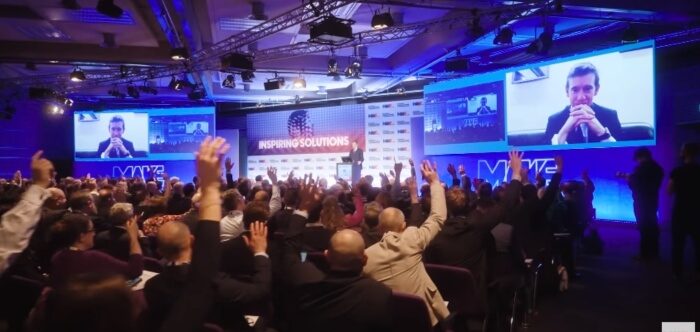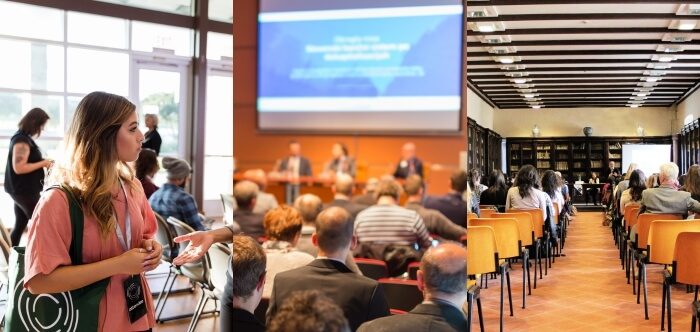Facing the hurdle of funding your trip to an international conference? You’re not alone. Many professionals and students grapple with this challenge. Yet, with the right strategy, this obstacle can turn into an opportunity. Ever wondered, how to get sponsorship for attending an International Conference?
To secure funding Investigate possible sponsors, personalize your proposal with a focus on shared advantages, show off your value and relevancy, provide brand visibility, and maintain clear communication. Build lasting relationships for future opportunities.
So, if you’re ready to turn your conference dreams into reality, keep reading. We’re here to guide you every step of the way, ensuring you make the most of this golden opportunity.
What is an International Conference?
An international conference is a large gathering where experts and enthusiasts from different corners of the world convene to discuss specific topics. At these internationally held conferences, researchers share their innovations and best practices with a global audience. Attendees benefit from diverse perspectives, and the collaborative atmosphere often sparks new ideas and solutions.

Such conferences encourage global collaboration, enabling professionals, researchers, and students to connect with peers from different countries. Whether it’s an international conference in Canada, the U.S., or Japan, these gatherings encourage knowledge sharing and cultural exchanges, broadening perspectives and strengthening international partnerships.
Many sectors, including science, technology, arts, and humanities, host international conferences annually. While the primary focus is usually on discussions and presentations, these gatherings also include workshops, panel discussions, and networking events. As a result, participants not only gain knowledge but also build valuable connections for future endeavors.
Why Do You Need Sponsorship for Attending an International Conference?
Attending international conferences can be an enriching experience, but it often comes with substantial costs. Securing sponsorship can alleviate these expenses and provide additional benefits to attendees.
Enhancing Professional Image
Securing a sponsor for an event speaks volumes about your credibility. It’s an endorsement of your skills, expertise, and potential contributions. This can elevate your stature among peers and open doors for future opportunities.
Access to Exclusive Opportunities
Some sponsors offer more than just financial assistance. They might provide exclusive networking sessions, workshops, or training programs. These added benefits can boost your conference experience and contribute to your professional growth.
Offsetting High Expenses
Participating in international conferences offers valuable opportunities for professional growth, but it can also be costly. From registration fees to travel and accommodation, expenses pile up. Sponsorship can be a game changer here, potentially allowing you to attend international conference for free. This financial support makes accessing these valuable learning and networking opportunities much more accessible.
Focus on Learning, Not Finances
With financial concerns out of the way, attendees can concentrate fully on the conference. This undivided attention ensures maximum learning, networking, and participation, enhancing the overall experience.
Building Long-Term Relationships
Sponsorship isn’t just a one-off transaction. It’s the beginning of a relationship between the attendee and the sponsor. This association can lead to future collaborations, partnerships, or job opportunities.
Securing sponsorship for international conferences is about more than just covering costs. It’s about enhancing the overall experience, building relationships, and paving the way for future opportunities.
How to Get Sponsorship for Attending an International Conference?
It can be a great opportunity to discover new knowledge and make connections at an international conference. However, obtaining sponsorship to attend an international conference can make this experience more accessible. Here’s a step-by-step guide on how to get sponsorship for attending an international conference:
Step 1. Understand Your Value Proposition
Before approaching potential sponsors, assess what you bring to the table. Your expertise, achievements, and potential contributions to the conference can be enticing. Highlighting these attributes, along with your commitment to the field, will make your case stronger and more appealing.
Step 2. Research Potential Sponsors
Identify companies and organizations that align with your field of study or profession. Look for those with a history of sponsoring events or individuals, and dive into their missions and values. Make your proposal based on their interests, goals, and past sponsorship engagements.
Step 3. Craft a Tailored Proposal
A well-structured proposal can make all the difference. Outline the benefits the sponsor will gain, such as brand exposure or networking opportunities. Ensure it’s concise, professional, and highlights mutual benefits. Include a clear outline of your schedule or activities during the conference.
Step 4. Offer Brand Exposure
In return for sponsorship, provide avenues for brand visibility. This could be through wearing their logo, mentioning them in your presentations, or promoting them on social media during the conference. Consider other creative ways, like post-conference articles or webinars, to give them additional exposure.
Step 5. Network and Seek Recommendations
Leverage your existing networks, from academic advisors to professional colleagues, to find connections that might lead to potential sponsors. A recommendation or introduction can sometimes be more effective than a cold outreach. Attending local events or workshops can also introduce you to potential sponsors.
Step 6. Be Transparent and Professional
Clearly communicate the amount needed, how it will be used, and any other expectations. Provide a breakdown of costs, such as travel, accommodation, and registration fees. Transparency creates trust, showing potential sponsors that you’re professional, organized, and respectful of their contribution.
Step 7. Maintain and Nurture the Relationship
Sponsorship is not just about the financial aspect. It’s the beginning of a partnership. After the conference, send a thank-you note, share your experiences, feedback, and photos, and keep them updated on future endeavors or research developments.
By precisely following these steps and staying proactive, you can heighten your chances of securing valuable sponsorship. This, in turn, allows you to fully engage in the rich learning and networking opportunities that international conferences present.
Various Types of Sponsors
Sponsorships play a key role in various events and projects, bringing them to life. While the word ‘sponsor’ may seem straightforward, there are various types, each with distinct characteristics and purposes. Let’s dive into the diverse world of sponsors.
Financial Sponsors
Financial sponsors primarily provide monetary support to an event or initiative. Their main goal is often to gain a return on their investment. They usually engage in sectors where they foresee substantial profit margins. Events backed by financial sponsors often receive ample funding due to the sponsor’s vested financial interest.
Media Sponsors
Media sponsors offer publicity and media coverage in exchange for sponsorship acknowledgment. They can effectively increase the visibility of an event. This type of sponsorship is common for large events needing significant media attention. In return, they gain content and increase their audience reach.
In-Kind Sponsors
Instead of money, in-kind sponsors offer goods or services that an event might require. This can range from food and drinks to technical equipment. Their contribution reduces the overall cost of organizing the event. They benefit by showcasing their products or services to attendees.
Promotional Partners
Promotional partners help boost event visibility through various marketing strategies. They utilize their networks to spread the word, enhancing event attendance. Their role is significant in reaching wider audiences and ensuring event success. Collaborations with such sponsors often lead to mutual brand elevation.
Academic or Research Sponsors
These sponsors are often educational institutions or research organizations. They support events that align with their academic or research goals. Their support legitimizes and increases the credibility of educational or research-based events. In return, they gain recognition, findings, or potential collaborations.
Social or Environmental Sponsors
Social or environmental sponsors back initiatives that align with their cause or mission. They aim to create positive social or environmental impacts. Their support often brings authenticity and credibility to socially-driven events. In partnering, both parties further their shared vision for change.
Sponsorships offer a wide range of options. By understanding how different sponsors operate and what their needs are, a smooth partnership can be formed. This ensures mutual success for both sponsors and events. To make a successful collaboration, match the sponsor’s goals with the event’s needs when requesting conference funding support.
What to Do After Getting Sponsorship?
Acquiring sponsorship is a significant milestone, but the journey doesn’t end there. The next steps are key to ensure a fruitful collaboration and pave the way for future partnerships. Let’s explore the essential post-sponsorship actions.
- Acknowledge the Sponsorship: Express gratitude promptly and sincerely to your sponsor. A personalized thank-you note goes a long way. It sets the foundation for a positive working relationship.
- Draft a Clear Agreement: Outline the terms of the sponsorship in a formal agreement. This document should detail both parties’ responsibilities and expectations. It prevents misunderstandings and ensures transparency.
- Provide Regular Updates: Keep your sponsor informed about event progress and developments. Share milestones, challenges, and any media coverage. Regular communication promotes trust and engagement.
- Deliver on Promised Exposure: Ensure the sponsor receives the promised brand visibility, whether on event materials, banners, or digital platforms. Consistent and accurate representation is crucial. It solidifies the sponsor’s trust in your commitment.
- Gather Feedback: After the event, seek feedback from the sponsor about their experience. Understand their perspective and any areas of improvement. This information is invaluable for refining future collaborations.
- Maintain the Relationship: Continue engaging with your sponsor even after the event concludes. Share updates about the impact of their support. Upbringing this relationship can lead to potential future sponsorships.
Remember, a sponsorship is not just a financial transaction; it’s a partnership built on trust, mutual benefits, and shared goals. Ensuring smooth post-sponsorship management is key to making the collaboration a resounding success.
Conclusion
It may initially appear impossible to secure sponsorship for important events such as international conferences. However, by grasping the complexity of “How to get sponsorship for attending an International Conference?” these obstacles become real opportunities. One can secure the necessary funding and create long-lasting professional relationships by recognizing the various kinds of sponsors and carefully fulfilling post-sponsorship obligations.
The essence of such sponsorships goes beyond monetary aid. They offer a platform to maximize one’s conference experience, expand networks, and elevate professional development. With a clear strategy and intent, attendees can leverage these partnerships to their advantage.
In today’s interconnected world, where collaboration and exchange of knowledge are invaluable, these sponsorships act as bridges. They create pathways for shared learning, mutual growth, and unlocking exceptional global opportunities.







